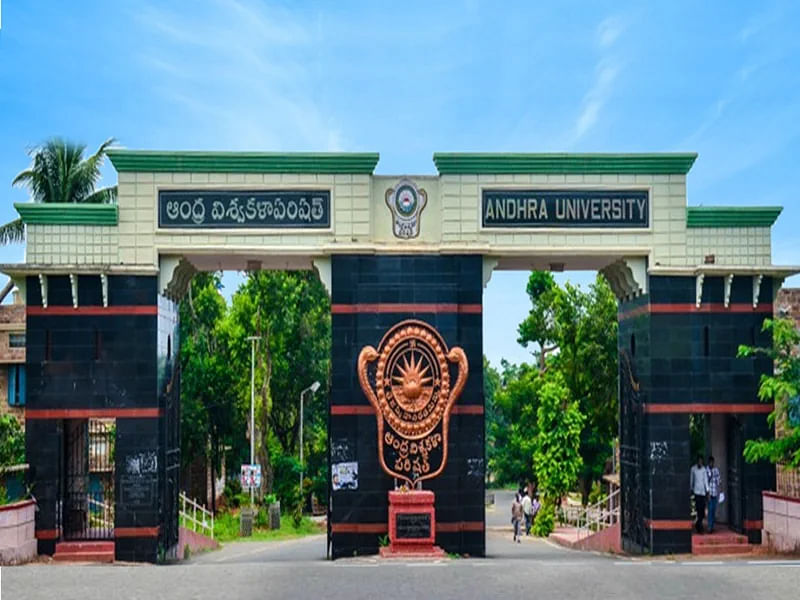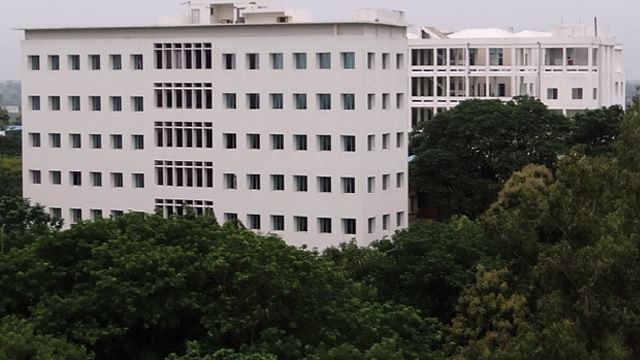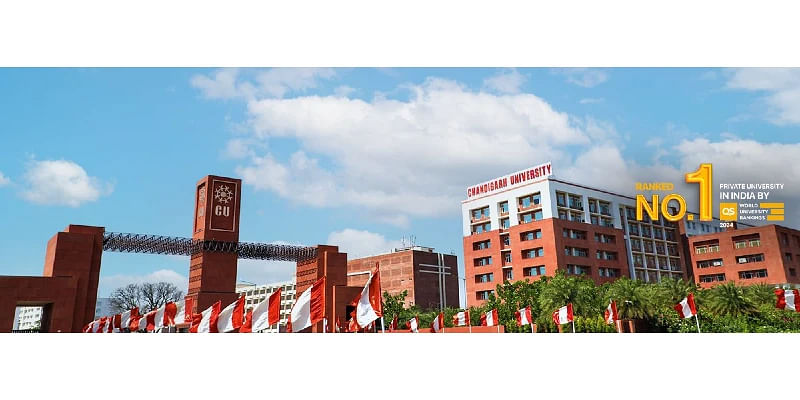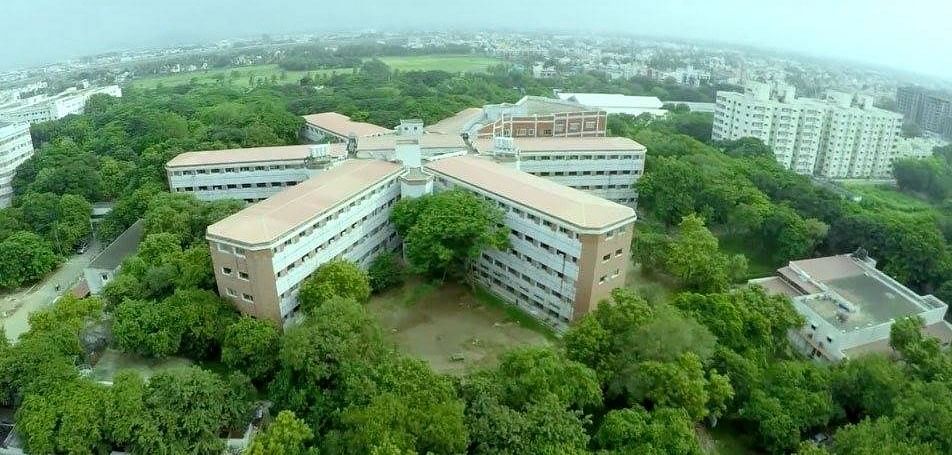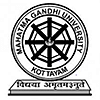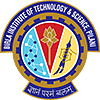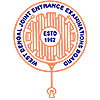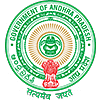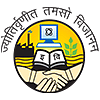Pharm.D [Doctorate of Pharmacy]: Course Details, Eligibility, Fees, Admission
Pharm.D is a six-year PhD postgraduate degree programme that deals with the study of analytical chemistry, monographs of inorganic chemicals and clinical study of drugs and experiments. The course duration includes 5 years of academic studies and one year of internship for students. Pharm.D course offers various opportunities in employment roles such as Drug Advisor, Clinical Pharmacist, Lecturer, Medical Writer, etc.
Table of Contents
- About Pharm.D
- Eligibility Criteria For Pharm.D
- How To Get Admission to Pharm.D
- Pharm.D Lateral Entry
- Who Should Pursue Pharm.D?
- Types of Pharm.D
- Pharm.D Specializations
- Popular Entrance Exams For Pharm.D
- Top Pharm.D Colleges in India
- Fee Structure For Pharm.D
- Syllabus And Subjects For Pharm.D
- Course Comparison: Pharm.D vs B.Pharm
- Pharm.D College Comparison
- Why Choose Pharm.D
- Preparation Tips For Pharm.D
- Scope For Higher Education
- Pharm.D Salary
- Career Options After Pharm.D
- Skills That Make You The Best Pharm.D Graduate
Pharm.D Course Details
| Degree | Doctorate |
| Full Form | Doctor of Pharmacy |
| Duration | 6 Years |
| Age | Minimum 17 years of age |
| Minimum Percentage | 50% |
| Average Fees | ₹50K - 2 LPA |
| Average Salary | INR 3.5 LPA [Source: PayScale] |
| Employment Roles | Clinical Pharmacist, Pharmacologist, Clinical Research Associate (CRA), Junior Clinical Research Associate (CRA), Data Analyst, Business Development Manager, Research Scientist etc |
| Top Recruiters | Quintiles, Inc., Syngene, Sun Pharmaceuticals, Glenmark Pharma, Zydus Cadila, Biocon, GlaxoSmithKline, Cipla Inc., Apollo Hospitals, BioClinica, Fortis Hospitals, Glenmark Pharma, Fortis etc |
About Pharm.D
Pharm.D duration is a six-year doctorate program under the science stream, with aim of teaching the principles of analytical chemistry, as well as the study of specific inorganic substances' monographs. Pharm.D full form is Doctorate of Pharmacy. The Pharm.D syllabus and subject are structured in a way that gives graduates a wide range of employment options.
The Pharm.D job scope is extensive, ranging from Clinical Pharmacist, Data Analyst to Pharmaceutical Advisor in both private and government sectors.
Eligibility Criteria For Pharm.D
Students must clear the 10+2 examination from any recognized board or school. The basic Pharm.D eligibility criteria include securing 50% aggregate marks in the 10+2 exam and sound performance in the Pharm.D entrance exams for respective colleges. The minimum age for Pharm.D eligibility is 17 years.
Students should note that the eligibility criteria for the 6 years Pharm.D course and the 3-year Pharm.D are different.
Eligibility For Six-Year Pharm.D Course
Below are the eligibility criteria for the 6-year Pharm.D Course:
- Candidates must have completed Level 10 + 2 from the State / National Board of Education.
- They must be studying physics and chemistry as compulsory subjects.
- The minimum age limit is 17 years old for the year of admission.
Eligibility For Three Year Pharm.D Course [Post Baccalaureate]
Below are the eligibility criteria for the 3-year Pharm.D Course:
- The candidate who passed the bachelor's degree course in pharmacy from an institution approved by the Indian Pharmacy Council can enrol.
- Must have completed higher and secondary education 10 + 2 or equivalent in physics, chemistry, mathematics, or biology subjects.
How To Get Admission to Pharm.D
The admissions to the Pharm.D course can be done through both online and offline methods. Pharm.D admissions are also available from the website or by directly visiting the college's admissions office. Listed below are the details of the Pharm.D admission process in general:
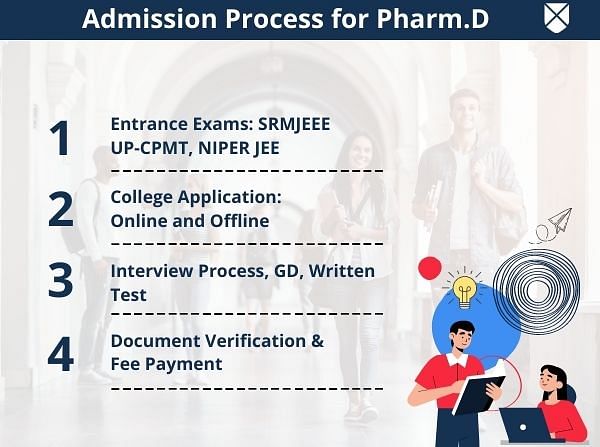
How To Apply?
Pharm.D course information is available on the Pharm.D colleges in India through which the aspirants begin their application process. The Pharm.D course applications in India are available to students through both online and offline modes.
How to get Admission to Top Pharm.D Colleges?
Pharm.D course duration includes 5 years of academic studies and one year of internship for students of doctorate level. Job opportunities are available in various fields after a long duration of enmeshing skills and aptitude in pharmaceutical science training.
Students can follow these guidelines to enrol in a good university:
- Students must research online about the admission process.
- Students should be aware of areas of interest, strengths, and weaknesses as they prepare.
- Address the weaknesses, get the best results
- Apart from merit-based admission, Pharmacy colleges in India conduct entrance exams for admission to Pharmacy courses like MHT CET, AP EAMCET, TS EAMCET, KEAM, WBJEE, KCET, etc.
Selection Process
The selection process for Pharm.D admissions is usually based on the candidate’s performance in the 10+2 examinations. In some Pharm.D colleges, admissions are strictly offered to only those candidates who pass a Pharm.D entrance exam of the respective colleges such as GPAT, UP-CPMT, and UPSEE.
Pharm.D Lateral Entry
Pharm.D Lateral Entry admissions are available to candidates who have completed their Diploma in Pharmacy or B.Pharmacy course. Lateral Entry for Pharm.D is done for the 6-year-long Pharm.D (Pre Baccalaureate) course. Pharm.D Lateral Entry candidates can join the course from the 4th year onwards.
Who Should Pursue Pharm.D?
Pharm.D is a six-year pre-PhD postgraduate program that deals with the clinical study of drugs and experiments, which further helps treat patients in Pharmaceutical Science. The Pharm.D scope is very high for the aspirants owing to the relevance of the education that the students recieve.
- Candidates interested in working with various drug regulators to prevent drugs or drug overdose should take this course.
- Applicants interested in a healthcare career can pursue a Pharm.D course
- Candidates wishing to pursue a career in pharmacy should take this course.
When To Do Pharm.D
Aspirants can take up the Pharm.D course immediately after completing their 10+2 from a recognized board. For the 3-year Pharm.D course, aspirants can apply for the course after completing their Bachelor of Pharmacy or B.Pharm degree.
Types of Pharm.D
The Pharm.D degree is apt for students interested in the healthcare industry. The duration of the course is 6 years. There are 2 types of Pharm.D courses that students can opt to pursue, as follows:
Pharm.D (Pre Baccalaureate)
Pharm.D (Pre Baccalaureate) is a 6-year doctoral degree program where students will have to complete 5 years of academic study and a 1-year internship at a hospital. Students who have completed their 10+2 can apply for this course.
Pharm.D (Post Baccalaureate)
Pharm.D (Post Baccalaureate) is a 3-year doctoral degree program that sees students complete 2 years of academic study and a 1-year internship at a hospital. B.Pharmacy and Diploma in Pharmacy graduates are eligible for this course.
Pharm.D Specializations
Students enrolled in the Pharm.D program must complete the standard curriculum set by the Indian Pharmacy Council. The Doctor of Pharmacy focuses on pharmacies, pharmaceutical chemistry, pharmaceutical microbiology, etc.
Pharmaceutical Technology: Pharmaceutical technology involves implementing scientific knowledge to develop new methods for the manufacture of drugs and processes.
Pharmaceutical R&D: In pharmaceutical R & D, new drugs are discovered by recognizing the active ingredients in traditional medicine and treatments, or discoveries such as penicillin.
Medicinal Chemistry: Medicinal Chemistry deals with the research and development of pharmaceuticals. Drug discovery, delivery, human consumption, and metabolic responses form part of this area. Biomedical analysis, pharmacology, pharmacokinetics, and pharmacodynamics form part of medicinal chemistry.
Industrial Pharmacies: Industrial pharmacies handle the manufacture, development, promotion, and distribution of medicines to end-users.
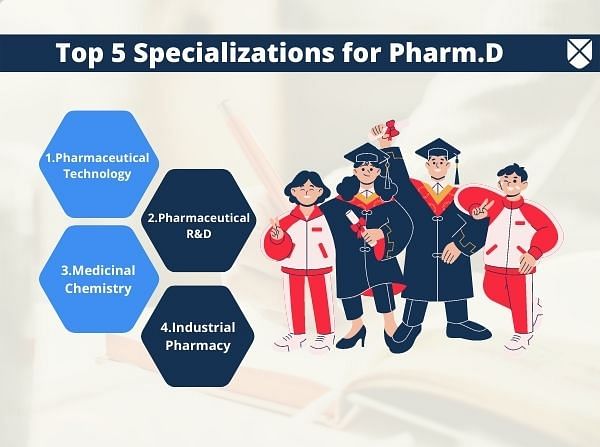
Popular Entrance Exams For Pharm.D
For the Pharm.D admission process, the selection of candidates is either based on merit or through an entrance exam conducted by the institution. Pharm.D colleges or universities ensure they select the best student with the desired knowledge and skill set with the entrance exam process. Listed below are some of the popular entrance exams for the 6 years Pharm.D course duration:
- GPAT
- UPSEE
- NIMS Entrance Exam
- VELS Entrance Exam
- Bharatiya Vidyapeeth Common Entrance Test
- SRMJEEE
- UP-CPMT
- NIPER JEE
A Quick Glance At The Pharm.D Entrance Exams
Students, who wish to appear for the Pharm.D entrance exam should ask, ‘What is Pharm.D?’ They should adequately study the exam pattern and the syllabus beforehand. Listed below are the detailed pattern of the Pharm.D entrance exam:
- The duration of the exam is 180 mins
- It is a computer-based test
- The number of questions asked is 125
- All questions will be asked in an MCQ format
- Each correct answer carries 4 marks
- Each wrong answer has a negative marking of 1
Top Pharm.D Colleges in India
Even though Pharm.D was introduced in 2008, it has come a long way to be recognized as a top-tier career prospect for many students. Many top institutions in India have included the Pharm.D course in their curriculum. Listed below are the top Pharm.D colleges in India:
| Sl.No. | Name of the Institute | Average Fees |
| 1. | Poona College of Pharmacy | INR 1.75 LPA |
| 2. | Chandigarh University | INR 2 LPA |
| 3. | Jaipur National University | INR 1.1 LPA |
| 4. | Chaitanya Degree and PG College | INR 1 LPA |
| 5. | Smt. Sarojini Ramulamma College of Pharmacy | INR 80,000 PA |
| 6. | JSS College of Pharmacy, Ooty | INR 2.8 LPA |
| 7. | SRM University Kattankulathur Campus | INR 1.66 LPA |
| 8. | MS Ramaiah University of Applied Sciences | INR 2.3 LPA |
| 9. | Sri Ramachandra University | INR 1.75 LPA |
| 10. | Goa College of Pharmacy | INR 2.9 LPA |
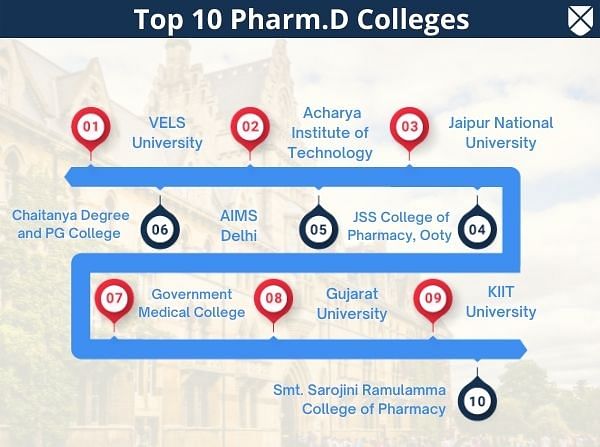
Pharm.D Colleges in Bangalore
Below is a list of the top Pharm.D colleges in Bangalore with average fees:
| Name of the College | Average Fees |
| Dayananda Sagar University | INR 3.7 LPA |
| MS Ramaiah University | INR 2 LPA |
| Krupanidhi College of Pharmacy | INR 17.5 LPA |
| Karnataka College of Pharmacy | INR 1 LPA |
| T John College of Pharmacy | INR 1.3 LPA |
Read More: Top Pharm.D Colleges in Bangalore
Pharm.D Colleges in Hyderabad
Below is a list of the top Pharm.D colleges in Hyderabad with an average fee:
| Name of the College | Average Fees |
| Sultan Ul Uloom College of Pharmacy | INR 4.8 LPA |
| Sri Venkateshwara College of Pharmacy | INR 4.1 LPA |
| Anurag Group of Institutions | INR 6.2 LPA |
| RBVRR Women’s College of Pharmacy | INR 4.2 LPA |
| Malla Reddy College of Pharmacy | INR 5.4 LPA |
Read More: Top Pharm.D Colleges in Hyderabad
Pharm.D Colleges in Coimbatore
Below is a list of the top Pharm.D colleges in Coimbatore with an average fee:
| Name of the College | Average Fees |
| Sri Ramakrishna Institute of Paramedical Sciences, Coimbatore | INR 9.6 LPA |
| Karpagam University | INR 15 LPA |
| RVS College of Pharmaceutical Science, Coimbatore | INR 4.0 LPA |
| Karpagam College of Pharmacy | INR 18 LPA |
Read More: Top Pharm.D Colleges in Coimbatore
Pharm.D Colleges in Chennai
Below is a list of the top Pharm.D colleges in Chennai with average fees:
| Name of the College | Average Fees |
| SRUSRMCRI | INR 7.5 LPA |
| Vels University | INR 2 LPA |
| Jaya College of Paramedical Sciences College of Pharmacy | INR 2.7 LPA |
Read More: Top Pharm.D Colleges in Chennai
Pharm.D Colleges in Pune
Below is a list of the top Pharm.D colleges in Pune with average fees:
| Name of College | Average Fees |
| Poona College of Pharmacy | INR 5 LPA |
| Indira College of Pharmacy | INR 7 LPA |
| College of Pharmacy | INR 7 LPA |
Read More: Top Pharm.D Colleges in Pune
Pharm.D Governement Colleges
Below is a list of the top Government Pharm.D colleges:
| SI.No. | Name of College |
| 1 | Andhra University |
| 2 | Annamalai University |
| 3 | Andhra University College of Pharmaceutical Sciences |
| 4 | L M College Of Pharmacy |
| 5 | Government Pharmacy College |
Pharm.D Private Colleges
Below is a list of the top Private Pharm.D colleges:
| SI.No | Name of College |
| 1 | Manipal University |
| 2 | Sri Ramachandra Institute of Higher Education and Research |
| 3 | Birla Institute of Technology |
| 4 | PES University |
| 5 | Jaipur National University |
Other Top Pharm.D Colleges in India
Fee Structure For Pharm.D
The average Pharm.D course fee in India is INR 50K-2LPA. The Pharm.D fees per year may vary on various factors such as Infrastructure, teaching facilities, institutional facilities, faculty, etc. Below is the list of the Pharm.D fee structure for various colleges in India:
| Sl.No. | Name of the Institute | Total Fee Structure |
| 1. | JSS College of Pharmacy, Mysore | INR 15.1 LPA |
| 2. | Sri Ramachandra University, Chennai | INR 7.5 LPA |
| 3. | Dayanand Sagar University, Bengaluru | INR 3.7 LPA |
| 4. | Poona College of Pharmacy, Pune | INR 10.5 LPA |
| 5. | Jaipur National University, Jaipur | INR 6.6 LPA |
| 6. | SRM University, Chennai | INR 15 LPA |
| 7. | Annamalai University | INR 10 LPA |
| 8 | DY Patil | INR 10 LPA |
Syllabus And Subjects For Pharm.D
Pharm.D course duration is usually divided into five years of academic training having 10 semesters and one year for internship. Below is the subject list of the Pharm.D offered by various colleges in the country:
- Pharmaceutical Analysis
- Pharmaceutical Jurisprudence
- Clinical Toxicology
- Hospital Pharmacy
- Pathophysiology
- Medicinal Biochemistry
- Human Anatomy and Physiology
- Biopharmaceutics and Pharmacokinetics
- Pharmaceutical Microbiology
- Community Pharmacy
- Pharmacotherapeutics
Read More: Pharm.D Syllabus and Subjects
Course Comparison: Pharm.D vs B.Pharm
Below is a comparison of PharmD and B.Pharmacy course through multiple parameters:
| Parameters | Doctor of Pharmacy | Bachelor of Pharmacy |
| Overview | Doctor of Pharmacy is a combination of science and art of dispensing medicines. Students are acknowledged as practical in clinical pharmacy and medical pharmacy. | This course aims at the candidates who want to open their pharmacy store or join the research industry. Also, it teaches about medicines, drugs, formulations, etc. |
| Duration | 6 years | 4 years |
| Eligibility | 10+2 with a minimum of 60% marks in the science stream | 10+2 with a minimum of 50% marks in the science stream |
| Admission Process | Merit-Based | Entrance Exam Based |
| Top Colleges | Chandigarh University, NIMS University, Manipal college of pharmaceutical sciences, Etc. | Jamia Hamdard, Panjab University, BITS Pilani, etc. |
| Job Roles | Pharmacists, Drug experts, Retail Pharmacists, Hospital Pharmacy directors, Hospital Staff Pharmacists, Clinical Pharmacists, etc. | Drug inspector, medical writer, pharmaceutical scientist, pharmacy business, etc. |
| Average Fees | INR 6– 20 LPA | INR 4 – 5 LPA |
| Average Salary | INR 3 – 10 LPA (Source- Glassdoor) | INR 2.5 – 6 LPA(Source- Glassdoor) |
| Top Recruiting Organization | Home Health Care, Community pharmacy, clinical pharmacy, geriatric pharmacy, managed care, governmental agencies, etc. | Hospitals, Government Drug Research Institutes, Medical Clinics, etc. |
Read More: B.Pharmacy
Pharm.D College Comparison
Given below is a college comparison of two colleges that provide the PharmD course in India:
| Parameters | Chandigarh University | NIMS University |
| Overview | Chandigarh University is situated in Chandigarh. It is a private university with an A+ grade by NAAC. | NIMS University is situated in Jaipur. According to ASSOCHAM, It is the best private university in 2018. |
| Location | Chandigarh | Jaipur |
| Eligibility | 10+2 with a minimum of 50% marks | 10+2 with a minimum of 50% marks |
| Admission process | Entrance exam | Entrance exam |
| Average fees | INR 2 LPA | INR 1.5 LPA |
| Top recruiting organizations | Microsoft, Samsung, Google, Amazon, Dell, IBM, Sapient, Oracle, Flipkart, etc. | Dell, Cisco, CNBC, IBM, Adobe, Cairn, Wipro, VIVO, Intex, HDFC Bank, etc. |
| Average salary | INR 7 LPA (Source- Glassdoor) | INR 4 LPA (Source- Glassdoor) |
Why Choose Pharm.D
With newer discoveries and infrastructure development being a continuous course of action, courses such as Pharm.D have gained a lot of importance in the last decade. Although a newer course, Pharm.D has managed to become an essential part of the college curriculum all around the globe. To understand ‘Why to choose Pharm.D?’, and "What is Pharm.D course?" we make it simpler by breaking it down into the following three questions:
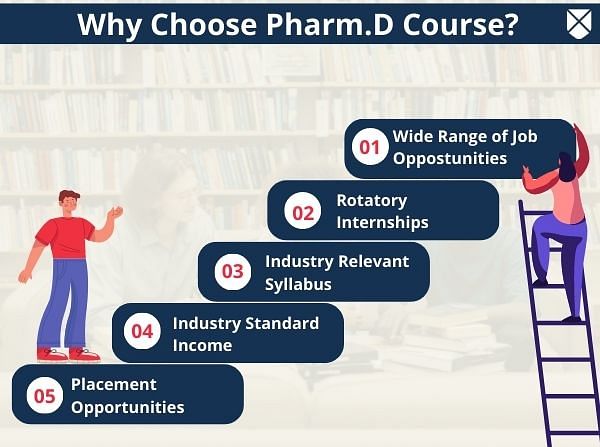
What is Pharm.D All About?
The Pharm.D course duration is six years that focuses on imparting various critical skills to students such as medical writing, therapeutic skills, counselling skills, persuasive skills, technical skills, and business skills. The Pharm.D course's full form is Doctor of Pharmacy. The Pharm.D course aims to sculpt the graduates into individuals with pharmaceutical skills to face the industry challenges and provide adequate solutions.
What Does a Pharm.D Graduate Do?
Pharm.D jobs can be a rich and fulfilling experience for aspirants who want to explore and contribute to the world of pharmaceutics and healthcare. There are various Pharm.D benefits available to graduates, including job postings such as Nutritionist, Medical Writer, Drug Advisor or work as a community practitioner for prescribing medications for chronic diseases.
Medical Writer: Medical writer works on creating scientific documents by associating closely with doctors, scientists, and other subject experts to elaborate vividly on the research results and the product’s usage. Medical Writers have become very reputable in the past few years with the industry demands concise writers that can put medical details clearly on a document.
Reasons Why Pharm.D Can Fetch You A Rewarding Career?
Pharm.D has today become a lucrative career not only because of the advancement in technology and medical research but also because healthcare has become one of the essential and dire human services.
Community Involvement: The need for Pharmacists is growing in the country as they provide legitimacy with their advice and prescriptions. Pharmacists spend years of study and training in understanding the world of Pharm.D courses and their uses.
Read More: Pharm.D Job Opportunities and Scope
Preparation Tips For Pharm.D
Students should be well prepared following the various aspects of the Pharm.D entrance exam. Some preparation tips for the Pharm.D entrance exam are listed below:
- Effective Time Management: A candidate should follow a practical timetable to enable them to do timely preparation. Students should focus on weaker subjects so as not to lose marks during the examination.
- Regular Practice: Regular practice throughout the preparation process ensures a well revised and ready-for-exam candidate.
- Debunking the Exam Pattern: Downloading and practising the question paper from the previous years helps to understand and debunk the pattern in which questions are asked.
- Enrolling in Coaching Institutes: Attending coaching classes during the preparation process helps the candidate gain a more straightforward path with the help of their mentors. Emphasis on weaker subjects also helps to gain leverage of scoring high in all topics.
Scope For Higher Education
Ample educational opportunities are available to Pharm.D degree holders who do not want to take up jobs immediately after graduation. Research skills become more polished with higher education experience, thus becoming an individual of high demand in various positions. Some of the higher education opportunities available for Pharm.D graduates are listed below:
Pharm.D Salary
According to payscale, the average Pharm.D salary offered in India is INR 3.5 LPA. The pay range goes higher as the graduate gains experience over time. Higher Studies after Pharm.D course duration also ensures a higher pay scale when entering a workforce.
Read More: Pharm.D Salary and Placements
Career Options After Pharm.D
While researching the Pharm.D course details in India, one should look into the career options that Pharm.D fetches for its graduates. Options vary for students who want to immediately enter the workforce compared to those who want to pursue higher studies. Graduates of Pharm.D interested in teaching can apply for the NET exam. Some of the popular roles available to Pharm.D graduates are:
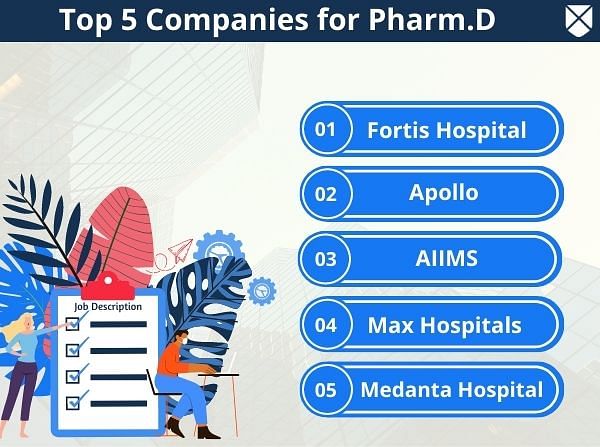
- Clinical Pharmacist
- Lecturer
- Drug Interaction Specialist
- Nutritionist
- Medical Writer
- Pharmaceutical Advisor
- Hospital Pharmacy Director
- Drug Expert
- Retail Pharmacist
Skills That Make You The Best Pharm.D Graduate
Management and interpersonal skills play a massive role in ensuring the student becomes a top-tier graduate as Pharm.D is not only about knowing the subject but also about providing community service and building relationships. Some of the skills are listed below:
- Interpersonal skills
- Accuracy skills
- Typing skills
- Proofreading skills
- Communication skills
- Counseling
- Multitasking
- Management skills
- Professional étiquettes
Top Pharm.D [Doctorate of Pharmacy] Colleges
Top Pharmacy Entrance Exams
Pharm.D Fee Structure
FAQs on Pharm.D
Q: Is Pharm.D and D.Pharm the same?
Q: Which is better: PharmD or BPharm?
Q: What is the difference between Pharm.D and PhD in Pharmacy?
Q: Is Pharm.D a good course?
Q: Is NEET required for Pharm.D?
Q: What are the top recruiting areas of Pharm.D?
Q: What are the government jobs for Pharm.D. in India?
Q: What is the scope of Pharm D?


